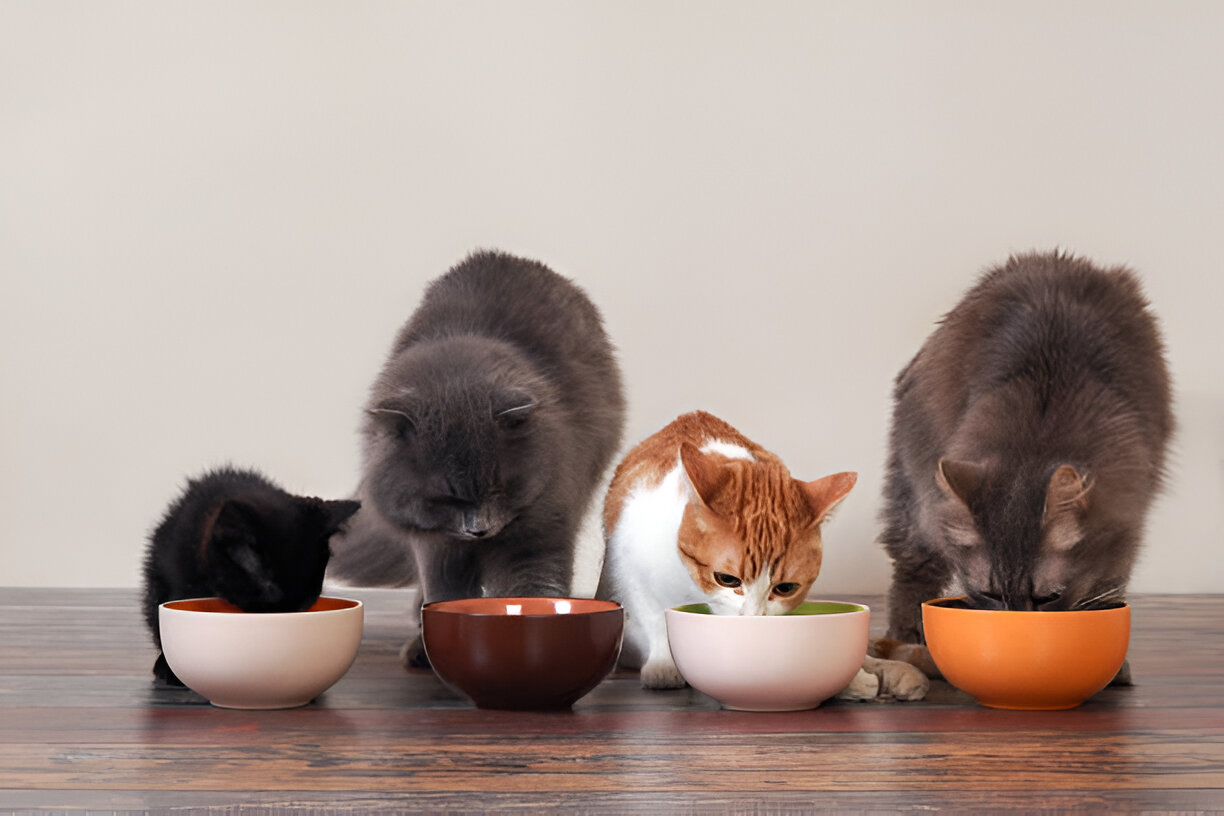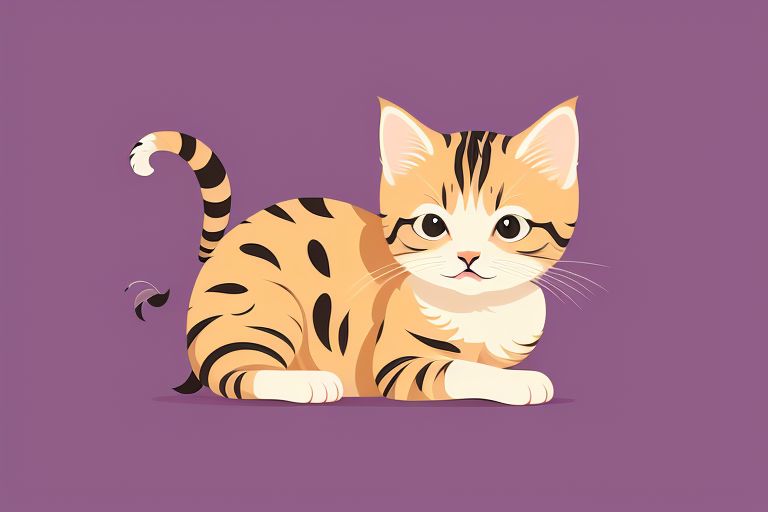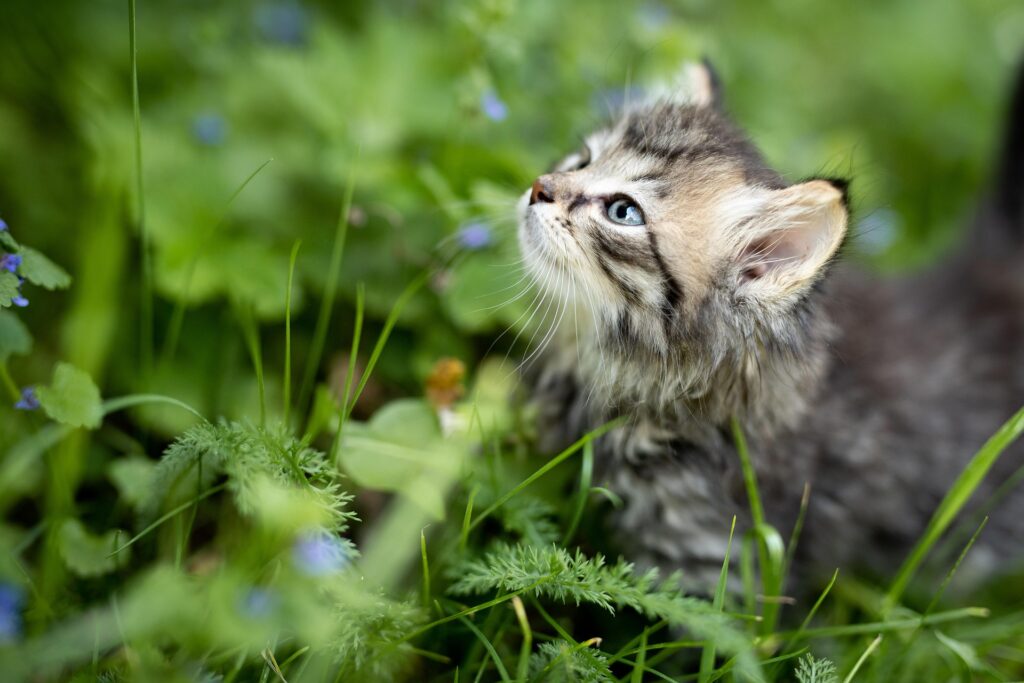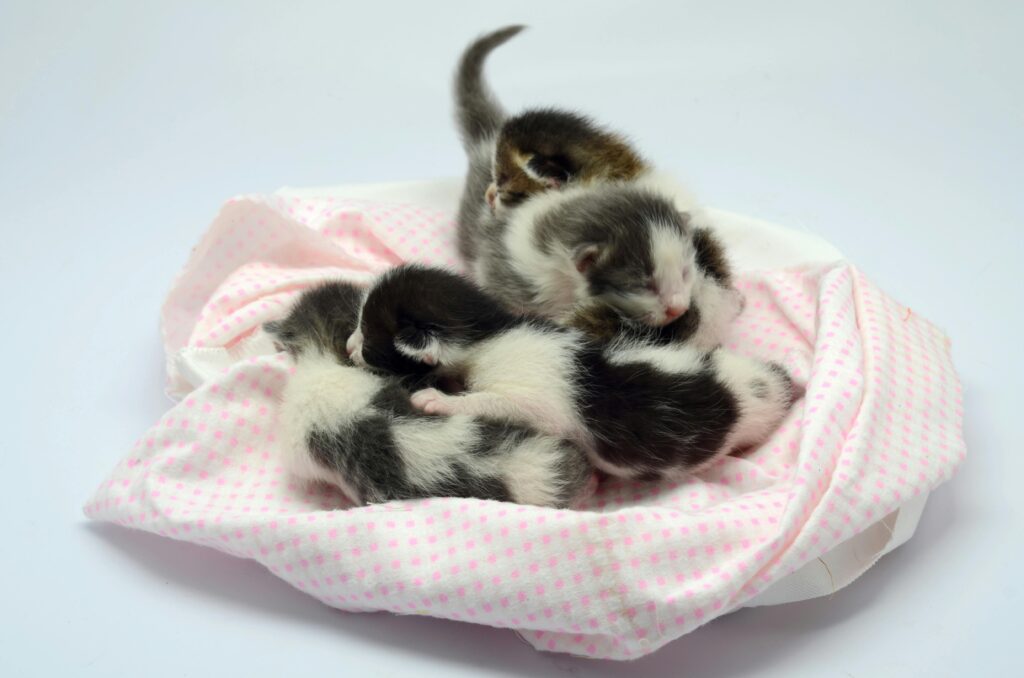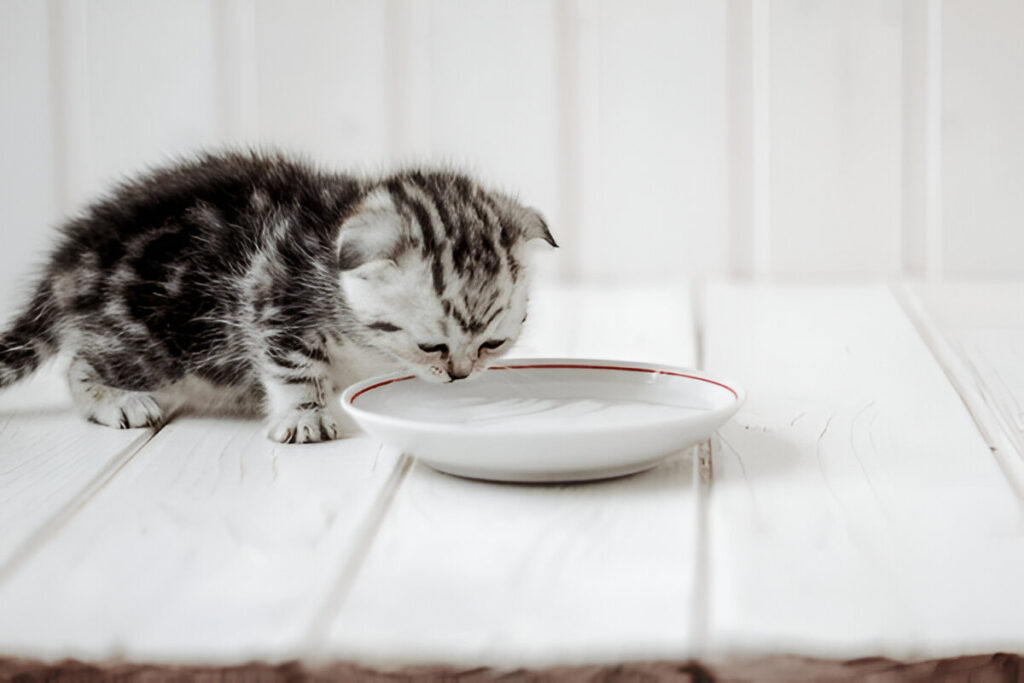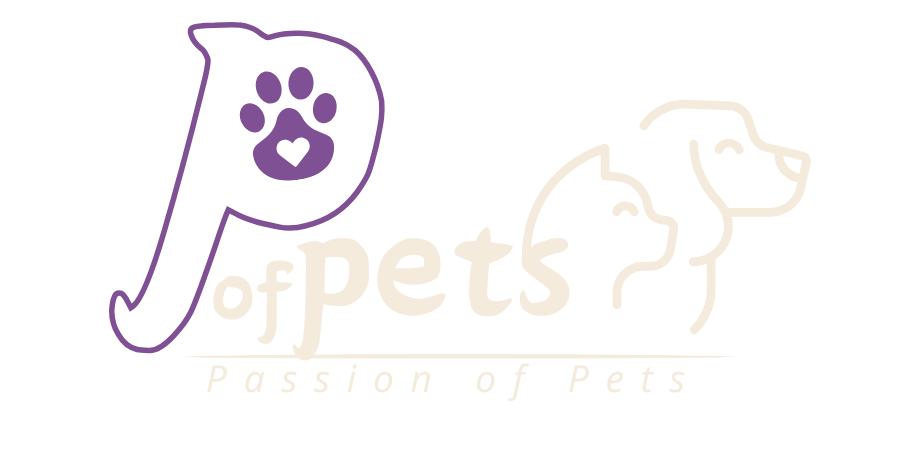The Risks of Feeding Kittens Adult Cat Food: What Every Pet Owner Should Know
When it comes to raising a healthy and happy kitten, nutrition plays a crucial role. Kittens have unique dietary needs that differ significantly from those of adult cats. While it might be tempting to feed your kitten the same food as your adult cat, doing so can pose serious risks to their growth and development. In this blog, we’ll explore why kittens require specialized nutrition and the potential dangers of feeding them adult cat food.
First-year kittens have a phenomenal growth phase in their first year of life, creating different nutritional needs than those for adult cats. Development within the body includes bones, muscles, organs, and an effective immune system-all requiring certain building blocks. Besides high-quality ingredients, here are some differences that exist between kitten food and adult cat food, more detailed and professionally explained below.
Higher Protein Needs
- Growth and Energy: Kittens, because of their rapid growth and high level of energy, require more protein. Protein is necessary in muscle tissue building, rebuilding cells, making enzymes, and producing hormones.
- Amino Acids: Kittens require a higher amount of these amino acids, which include taurine, essential for heart health, vision, and reproduction.
By comparison, adult cat food contains less protein; thus, potentially reducing the intake of such amino acids and, subsequently stunting development in the kitten.
Essential Fatty Acids
- Brain and Vision Development: Kittens require more fatty acids, especially DHA, which is very important for the development of the brain and vision. DHA is abundant in the mother’s milk and plays a very crucial role in the early stages of life.
- Skin and Coat Health: Skin and coat health is another major effect of these two fatty acids omega-3 and omega-6. These may not feature in an adult food formulation at rates critical to a kitten’s overall development.
Calcium and Phosphorus
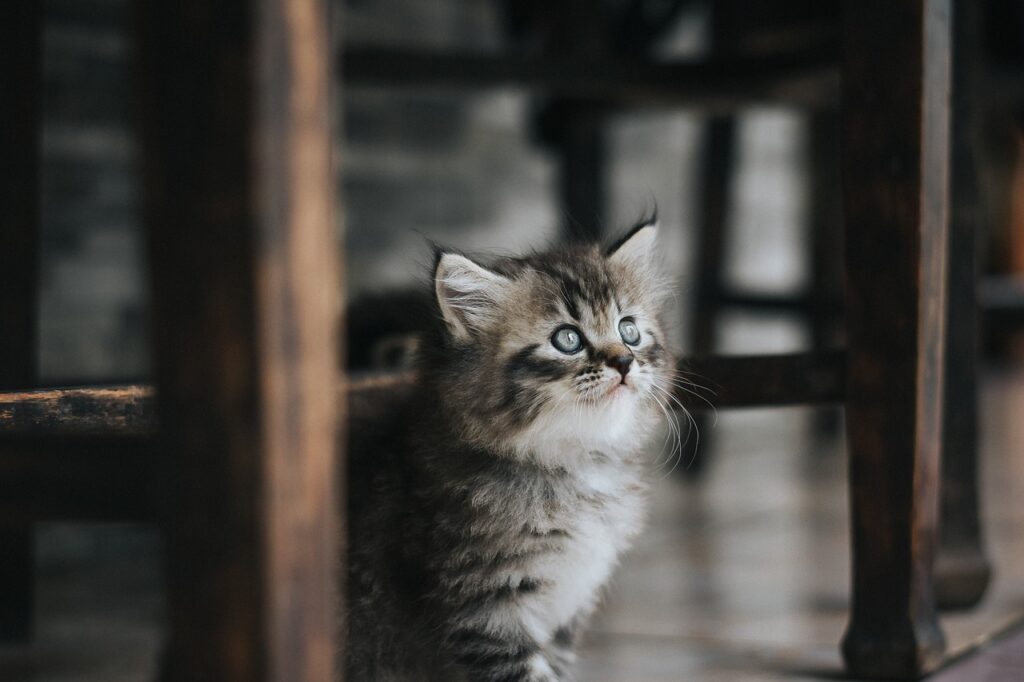
Image by Iqbal Nuril Anwar from Pixabay
- Bone Growth: The ideal balance between calcium and phosphorus is very important for the growth of bones in kittens. Both these minerals are very crucial for building strong bones and teeth.
- Optimal Ratios: Kitten food is specially formulated to provide these minerals in the right ratios. Adult cat food may not provide the right balance, which can result in developmental problems such as weak bones or skeletal deformities.
Caloric Density
- High Metabolism: Kittens have a high metabolism; thus, they burn their calories pretty fast because of their active nature and growth rates. They need calorie-dense foods to help them attain this energy requirement.
- Risk of Undernourishment: Adult cat foods are usually less calorie-dense, and if a kitten is fed only with this, they may easily suffer from undernourishment, leading to poor growth, low energy levels, and a compromised immune system.
Vitamins and Minerals
- Immune System Support: Kittens have a higher need for certain vitamins and minerals, like vitamin E and selenium, for their developing immune system.
- Overall Health: These also help in many other body functions, such as cell repair and antioxidant protection. Kitten food is enhanced with these necessary vitamins and minerals for overall development.
Digestibility
- Efficient Nutrient Absorption: Kittens have smaller stomachs with less developed digestive systems compared to an adult cat. Kitten foods are highly digestible to provide efficient nutrient absorption for them.
- Specialized Formulas: Adult cat food may be less easily digestible by kittens, thus causing digestive issues and poor nutrient absorption.
The Risks of Feeding Kittens Adult Cat Food
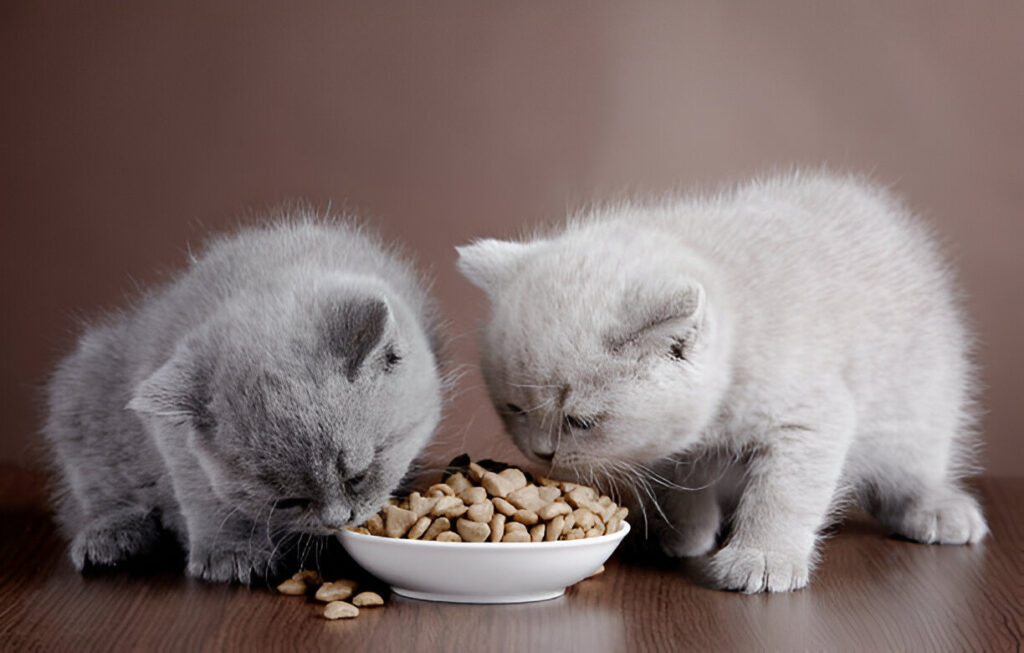
While this may be convenient or seemingly economic, feeding your kitten on an adult cat’s food will result in a set of health problems due to the coverage of nutritional needs. Kittens require another type of nutrition compared to an adult cat, and a wrong way of feeding may cause certain health problems that can occur either presently or later in its life. Following is a closer examination of some risks involved in feeding adult cat food to kittens:
Stunted Growth
- Lack of Sufficient Amount of Proteins and Nutrients: The protein, vitamins, and minerals percentages necessary for growing kittens far surpass what mature cats require to support healthy body growth and system development; whereas, matured cat food contains just that much-lowered dosage of critical nutrients which holds them back.
- Weakened Bones and Muscles: Absence of an appropriate level of calcium, phosphorus, and proteins will leave your kitten with a weaker bony framework accompanied by weaker and underdeveloped muscles, poor skeletal carriage, and thus lower physical strength.
- Compromised Immune System: A lack of essential nutrients can weaken a kitten’s immune system, making them more susceptible to infections and illnesses during this critical stage of life.
Nutritional Deficiencies
- Taurine deficiency: This amino acid is significant in the health of a kitten’s heart, eyes, and reproductive functions. Adult foods generally contain less of this ingredient, so there is a risk that insufficiency will lead to ailments such as cardiomyopathy diseases and problems with vision.
- Insufficient Amounts of Essential Fatty Acids: A kitten requires higher levels of fatty acids, including DHA, for brain development and vision. These nutrients are not available in sufficient amounts in adult cat food and may hamper cognitive and visual development.
- Vitamin and Mineral Deficiencies: Kittens have greater needs for vitamins, such as vitamin E and vitamin A, and minerals, such as zinc and selenium, to meet the requirements of their growing bodies. Adult cat food cannot fulfill these elevated needs, hence may lead to deficiency that could adversely impact their overall health.
Low Energy Levels
- Insufficient Calories: Kittens are very active and have a high metabolic rate; therefore, they need a highly calorific diet to meet their energy requirements. Adult cat food is not that rich in calories, and if given to kittens, it can make them underfed and lethargic.
- Less Playful: A kitten is innately playful and curious, but once there is not enough energy coming from their food intake, they may become less active and detached. This can also impact their social and cognitive development.
Digestive Issues
- Delicate Digestive Systems: Kittens have tender digestive systems that are yet to reach complete development. Adult cat food is developed based on the digestive capability of mature cats and may not be that easy for kittens to digest.
- Stomach Upset: Feeding kittens with adult cat food may bring them a variety of problems, such as stomach ache, bloating, diarrhea, and vomiting. These may cause a lot of discomfort for the kitten and might lead to dehydration or malnutrition if unheeded.
- Poor Nutrient Absorption: Even if the food contains some essential nutrients, a kitten’s immature digestive system may not be able to absorb them effectively, further exacerbating nutritional deficiencies.
Long-Term Health Problems
- Obesity and Diabetes: Poor nutrition in the kitten stage disrupts metabolic functions of the animal, which could lead to overweight conditions, increasing the risks for obesity and diabetes over time.
- Chronic Conditions: Nutritional imbalances at such an early age may have long-lasting effects; this includes a higher propensity for chronic conditions like kidney disease, liver problems, and joint issues.
- Developmental Delays: Poor nutrition at the critical growth period might result in chronic developmental delays that will be carried over throughout a cat’s lifetime, affecting its physical and mental health.
How to Choose the Right Food for Your Kitten
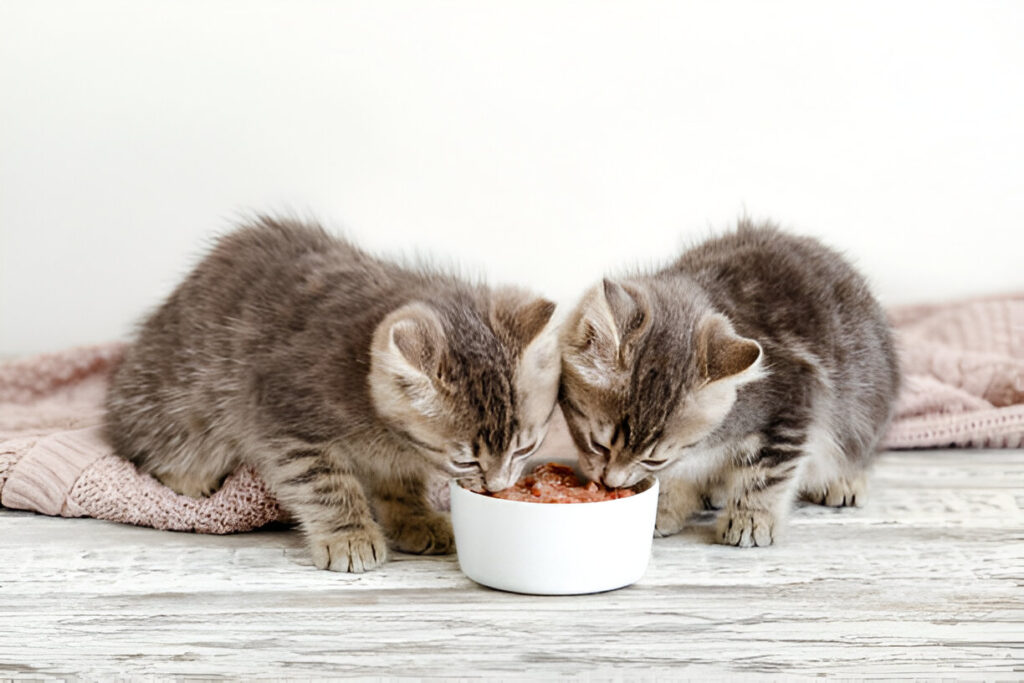
Choosing the right food for your kitten is about their growth, overall development, and health in general. Kittens have different nutrient requirements compared to adults, and setting them on a proper diet automatically sets them as strong and healthy adults. Here is a detailed guide that will assist you in the selection of appropriate food for your kitten:
Look for Kitten-Specific Formula
- AAFCO Standards: High-quality commercial kitten foods from companies whose products have met the nutritional standards laid down by organizations like the Association of American Feed Control Officials are good for consumption. Ensure that it has a statement on the label, indicating its formulation for growth or all life stages.
- Tailored Nutrition: Kitten-specific formulas are prepared to have the correct balance of protein, fats, vitamins, and minerals to support rapid growth, brain development, and a strong immune system.
- Wet vs. Dry Food: Wet and dry foods are both appropriate for kittens, but the majority of experts recommend a combination of both. Wet food is hydrating and usually more appealing, while dry food cleans the teeth and can be left out for free-feeding.
Check the Ingredients
- High-Quality Protein: First, a high-quality source of animal protein should be the first ingredient. Chicken, turkey, fish, or beef is very essential because an animal-based protein is required for muscle development in kittens.
- Avoid Fillers: Especially, avoid foods that contain a lot of fillers, such as corn, soy, or wheat. These are low in nutritional value and may be more difficult for your kitten to digest.
- Nutritional Needs: Look out for foods enhanced with taurine addition, omega-3 fatty acids that include DHA, and an accurate calcium-to-phosphorus balance in regard to brain development, vision development, and skeletal growth.
- Ingredient Naturality: Use foods incorporating natural ingredients and lessening processes without additions of artificial colorings, flavors, and preservatives.
Diet Homemade Recipes to Refrain from
- Nutritional Imbalance: Homemade foods can be deficient in the nutrients which kittens require during their growth stages. Homemade food, unless prepared upon a veterinarian or veterinary nutritionist formulation, would surely lead to deficiencies or their imbalances.
- Complexity: A balanced diet formulation for kittens needs very specific knowledge in terms of the nutritional needs for kittens, regarding the exact amount of protein, fats, vitamins, and minerals. Commercial foods for kittens are scientifically formulated.
- Raw Diet Risks: Raw diets may carry such risks as bacterial contamination -Salmonella, E. coli, and may not provide all necessary nutrients. If considering raw diet then do consult with the vet before it.
Transition Gradually
- Slow Introduction: If you’re switching your kitten to a new food, do so gradually over 7-10 days. Start by mixing a small amount of the new food with their current food, gradually increasing the proportion of the new food while decreasing the old food.
- Watch for Digestive Upset: Transitioning slowly can help prevent diarrhea, vomiting, or stomach upset. If your kitten is uncomfortable, please go slower.
- Patience is a Virtue: Kittens can be fussy eaters and may take some time to get used to their new diet. Be patient and consistent while transitioning.
- Feeding Recommendations: Your veterinarian will have particular recommendations about the type of kitten food to feed and when, depending on breed, size, age, and health status. Large breed kittens have different nutritional needs than the small breeds.
- Health Considerations: Specific health conditions or dietary needs your kitten may have could be pinpointed by your veterinarian, who can provide special recommendations for proper nutrition.
Regular Check-Ups: By taking your kitten to regular veterinary visits, you can monitor their growth and make changes in their diet when necessary. Your vet can also help you identify any warning signs of nutritional deficiencies or imbalances.
Additional Tips
Fresh Water: Make sure your kitten always has fresh, clean water. Proper hydration is a must for your kitten’s overall health, especially when eating dry food.
- Portion Control: Feed according to the feeding guideline on the package, adjusted by your kitten’s activity, growth rate, and appetite. Overfeeding may cause obesity; underfeeding causes stunted growth.
- Treats in Moderation: Not more than 10 percent of your kitten’s intake for a day. Choose health, kitten-only treats to prevent added calories or fillers.
When Can Kittens Start Eating Adult Cat Food?

Kittens should stay on kitten food until they reach about 90% of their adult size, which is typically around 10-12 months of age. Larger breeds, like Maine Coons, may need to stay on kitten food for up to 18 months. After this, you can gradually transition them to adult cat food.
Final Thoughts
Feeding your kitten the right food is one of the most important things you can do to set them up for a healthy life. While adult cat food might seem like a convenient option, it simply doesn’t provide the nutrients your growing kitten needs. By choosing a high-quality kitten formula and consulting your vet, you can ensure your furry friend thrives during this critical stage of life.
Remember, a well-nourished kitten is a happy kitten—and a happy kitten makes for a happy pet parent! 🐾
Do you have questions about your kitten’s diet? Share them in the comments below or reach out to your veterinarian for personalized advice. Let’s give our kittens the best start in life!
Yuns Legdm is a passionate advocate for pet care and the founder of this website, dedicated to providing valuable information for fellow pet lovers and veterinary professionals worldwide. With a deep love for animals, Yuns created this platform to connect passionate pet owners with expert insights from veterinarians around the globe.
This website grows with you—the passionate pet owners and veterinary experts—creating a trusted space where knowledge, experience, and love for animals come together. Whether you’re seeking advice on pet health, nutrition, or general well-being, this platform is here to support you on your journey of responsible and loving pet care.

